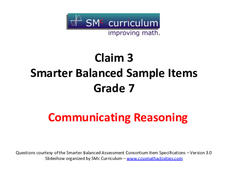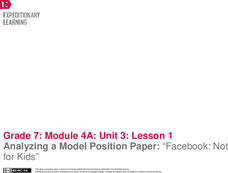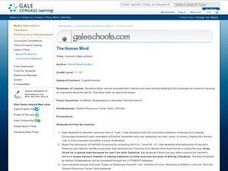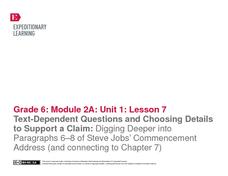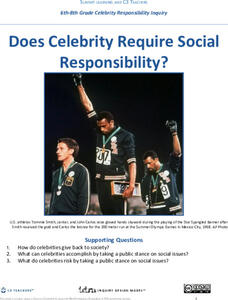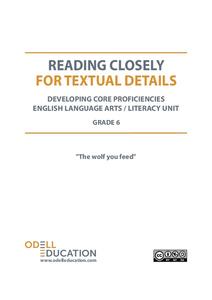Curated OER
"The Story of an Hour" Lesson 5: Teacher's Guide and Notes
Learning how to craft a compelling argument supported by evidence and logical reasoning is an essential skill. The fifth lesson in "The Story of An Hour" unit asks young scholars to formulate an argument in response to the question, 'Is...
CCSS Math Activities
Smarter Balanced Sample Items: 7th Grade Math – Claim 3
Does the explanation make sense? Sample items highlight claim three, communicating reason, in the Smarter Balanced assessments. Teachers use the 16 items to help show pupils the importance of communication and reasoning within...
K20 LEARN
Writing An Argumentative Paragraph: Argumentative Writing
Learning how to craft a cogent argument based on a solid claim, supported with evidence and solid reasoning, is an important life skill. Teach middle schoolers about argumentative writing with a lesson plan asking them to analyze the...
CCSS Math Activities
Smarter Balanced Sample Items: 8th Grade Math – Claim 3
Communication is the key. A dozen sample items require scholars to communicate their reasoning involved in arriving at a solution. The PowerPoint from the Gr. 8 Claim 2 - 4 Item Slide Shows series uses a variety of content to illicit...
EngageNY
Grade 9 ELA Module 4, Unit 1, Lesson 24
Who bears the most responsibility for ensuring that goods are ethically produced? Using evidence drawn from Sugar Changed the World: A Story of Magic, Spice, Slavery, Freedom, and Science, the unit's central text, and from the...
EngageNY
Grade 10 ELA Module 3: Unit 3, Lesson 2
Put yourself in my shoes! Scholars work through the Outline Tool from the previous lesson to develop a claim before developing a counterclaim about selling human tissue. Learners also create supporting claims using an outline tool. For...
EngageNY
Analyzing a Model Position Paper: “Facebook: Not for Kids”
It's time to take a position! Scholars learn to write a position paper by analyzing a model paper titled Facebook: Not for Kids. After studying the model paper, learners think about their own papers using the Position Paper Planner. They...
Fluence Learning
Writing an Argument: Persuasive Speeches to Students
Powerful orators make their messages compelling with a combination of factors. Learn how to be an inspirational speaker with a reading assessment activity that presents a list of persuasive speaking techniques, as well as two speeches...
Curated OER
Writing Effective Thesis Statements and Introductory Paragraphs for Research Papers
After reading on the topic of their paper, high schoolers work in pairs to assess how to write powerful, precise thesis statements. The introduction contains three statements: a universal statement, a bridge statement, and a thesis...
K20 LEARN
Friends, Romans, Countrymen, Lend Me Your Emotions: Julius Caesar
Scholars, high schoolers, class members! With the help of this lesson, you too can identify the three persuasive appeals (ethos, pathos, and logos) the characters in William Shakespeare's tragedy Julius Caesar used to convince their...
Curated OER
Express Yourself Lesson Seed 3
If you're looking to set your class up for writing effective arguments, try out this idea. While originally created with freedom as a guiding idea, the activity could easily be adapted for other themes. As a class, create a chart of...
Curated OER
Don't Let the Earth Down
Writing a persuasive argument starts with a clear thesis. Using this resource, your class will write a persuasive paper on a conservation issue. They will then transform their argument into a 30-second public service announcement. If...
Curated OER
Persuasive Writing I
Examine the characteristics of an effective persuasive paper. In a group, eighth graders discuss the analogy of a debate being like a persuasive paper. After brainstorming topics, they write an argument and then debate it. Secretly, the...
Curated OER
Hamlet's State of Mind
Analyze various excerpts from Hamlet and read articles to develop an argument about his sanity. Middle and high schoolers write an argument essay defending whether or not they believe Hamlet is insane. You could modify this assignment...
Southern Nevada Regional Professional Development Program
Was Bias A Factor? Make an Argument
The ability to analyze an argument is a skill emphasized by the Common Core standards. Offer your class an opportunity to develop and hone their skills by providing them the testimonies in an Oregon court case. After reading the facts of...
C3 Teachers
Black Genius: How Did Black Genius Help Build American Democracy?
"How did the slavery system undermine the United States' democratic principles?" This question launches a study of how the Preamble to the Declaration of Independence, Article I, Section 2 of the U.S. Constitution, and Article IV,...
Alabama Department of Archives and History
The Wrong Side of History: How One Group Justified Its Opposition on the Freedom Riders and Civil Rights for African Americans
Designed as a supplement to the study of the Freedom Riders, this resource uses primary sources to reveal the views of those who opposed the Freedom Riders. After careful study of the arguments presented by the members of the Montgomery...
EngageNY
Text-Dependent Questions and Choosing Details to Support a Claim: Digging Deeper into Paragraphs 6–8 of Steve Jobs’ Commencement Address (and connecting to Chapter 7)
Readers learn how to choose specific details drawn from a primary source (Steve Jobs' 2005 Stanford University commencement address) to support an analysis of informative text.
Cornell University
Fibers, Dyes, and the Environment
Nanofibers can be made through electrospinning or force spinning in order to reduce the negative impact on the environment. Pupils study the role of fibers and dye on the environment through a series of five hands-on activities. Then,...
C3 Teachers
Celebrity Social Responsibility: Does Celebrity Require Social Responsibility?
Is much required of those to whom much is given? That's the central question asked of middle schoolers in this lesson. Scholars consider the actions of Tommie Smith and John Carlos, Colin Kaepernick, Lady Gaga, and others who have taken...
C3 Teachers
Uncle Tom’s Cabin: Can Words Lead to War?
"Words, words, words." Despite Hamlet's opinion, words can be significant. In this inquiry lesson, middle schoolers learn how the words in Harriet Beecher Stowe's Uncle Tom's Cabin, in the view of many, lead to the American Civil War. To...
Odell Education
Reading Closely for Textual Details: Grade 6
Close reading doesn't mean to literally read text close to your face, but rather to pay attention to particular details in order to develop a deep and purposeful understanding of text. The first part of a five-part resource provides an...
The New York Times
I Don’t Think So: Writing Effective Counterarguments
When it comes to writing effective arguments, writers must do more than simply make a claim, counterarguments must be considered. Aspiring writers analyze counterarguments in editorials, and then learn how to write counterarguments in...
Curated OER
Argument of Policy
After investigating different policies within the school district, young reformers select a policy they would like to change. They then investigate the policy, and craft a letter in which they advocate a change to the policy. For guided...



